Watermelon increases or decreases blood pressure: can you eat it if you have hypertension?
Regular increases in blood pressure lead to serious consequences: with a sharp jump in blood pressure, there is a negative effect on the kidneys, heart, and liver.
To some extent, the well-known melon crop, watermelon, helps to reduce and prevent attacks of high blood pressure. Fruit pulp does not allow you to completely give up medications, but it has a beneficial effect on the cardiovascular system, reduces high blood pressure, enhances the effect of pharmaceuticals and reduces the need for them.
The article will discuss how watermelon affects blood pressure, what its benefits and harms are for problems with blood pressure, and how to use it correctly.
How does watermelon affect blood pressure?
Regular consumption of watermelon reduces and stabilizes high blood pressure, normalizes the pulse, serves to prevent the development of complications from the heart and blood vessels.
Citrulline and arginine were found in the edible part (pulp and rinds). These are amino acids responsible for maintaining vascular tone in the arterial bed, on which blood pressure and nutrition of all organs and tissues depend. When the body is deficient in citrulline and arginine, blood pressure increases.

Other effects of amino acids include the ability to reduce cholesterol levels, accelerate tissue regeneration, improve muscle nutrition, protect organs and tissues from the destructive effects of aggressive radicals, prevent the occurrence of atherosclerosis, cardiac ischemia, and influence other risk factors for hypertension.
Watermelon, having diuretic and choleretic properties, enhances the excretion of water and sodium, reduces plasma volume, reduces vascular resistance, as a result, the pressure drops to normal levels.
For reference. Watermelon contains a lot of plant fiber, which, like a sponge, cleanses the blood, liver, kidneys, removes waste and toxins, excess fluid from the body, activates intestinal motility, which together improves the prognosis for high blood pressure.
Does watermelon normalize, increase or decrease blood pressure?
Watermelon fruit pulp lowers high blood pressure and helps maintain normal levels, reduces cardiovascular risks. In case of arterial hypotension (persistent decrease in blood pressure), it is recommended to use melons with caution.
The answer to the question of whether blood pressure can rise again is clearly positive. Watermelon is not a medicine, and it cannot eliminate blood pressure problems forever. Features of the development and course of arterial hypertension depend on lifestyle, age, the presence of provoking factors, timely and well-chosen treatment.
The fruit pulp of watermelon serves as a good prophylactic against high blood pressure, but without accompanying treatment and rehabilitation measures it is not capable of dramatically affecting the outcome of the disease.
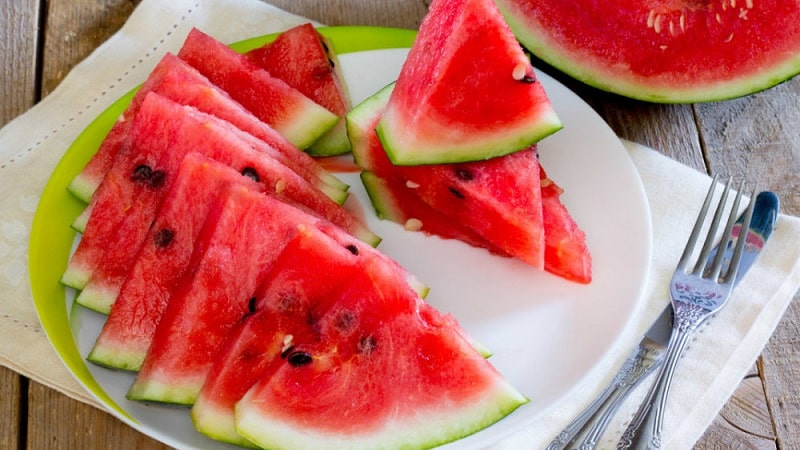
Is it possible to eat watermelon with high or low blood pressure?
Is it possible to eat watermelon with high blood pressure? Yes, it is used to quickly lower and stabilize blood pressure. The product has a diuretic, restorative, antioxidant effect on the body, removes protein waste, and regulates the tone of the vascular bed.
There is no clear answer to the question: is it possible to eat watermelon with low blood pressure?. It all depends on individual indicators. Fruit pulp has diuretic properties, due to which it is included in the list of prohibited products during the period of persistent decrease in blood pressure.
However other properties of watermelon confirm its usefulness for hypotension:
- lycopene improves the functioning of the cardiovascular system;
- replenishes the lack of iron in the body, increases the synthesis of red blood cells, as a result, the severity of the symptoms of hypotension (headache, dizziness) decreases, and blood pressure returns to normal;
- improves the condition of the walls of blood vessels, increases their elasticity, supplies the body with potassium and magnesium, which contribute to the full conduction of the heart.
Given the ability of watermelon to reduce high blood pressure, you need to consume fruit pulp in case of arterial hypotension in limited quantities, observing the body’s reaction.
This is interesting:
Is it possible to eat watermelon on an empty stomach?
Is it possible to eat watermelon if you have a stomach ulcer?
The benefits of watermelon for blood pressure problems
Watermelon has a positive effect on the heart and blood vessels. It has a choleretic effect, which relieves edema, cleanses the blood of harmful waste and toxins, reduces the load on the heart, and eliminates signs of stagnation of blood circulation.
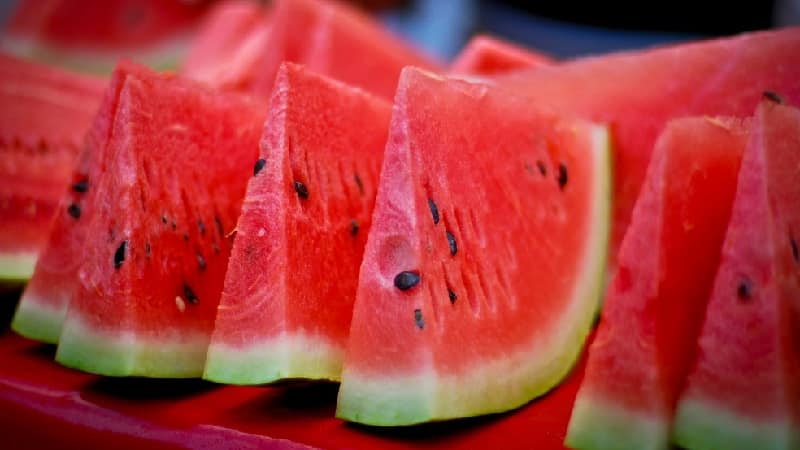
Citrulline and arginine have a pronounced effect on blood vessels, increase the concentration of nitric oxide in the blood, reducing blood flow to the heart.
For reference. With regular consumption of watermelon, the risk of atherosclerosis, ischemia, and myocardial infarction is minimized.
Possible harm
Watermelon has the ability to accumulate nitrates in the fruit pulpwhich are toxic to the body. When an excess amount of toxins enters the gastrointestinal tract, vomiting, nausea, dizziness, chills, and painful spasms in the stomach appear. Due to the excessive loss of fluid during diarrhea and vomiting, the water-electrolyte balance is disturbed and the body experiences dehydration.
That's why It is better to eat fruits grown on your own plot. If you buy berries at the market or in a store, it is important to choose a natural product.
Watermelon can be harmful to health, if there is an individual intolerance to one or more components of the composition. An allergic reaction manifests itself in the form of a rash, itching, peeling and redness of the skin; in the worst case, swelling of the mucous and soft tissues occurs.
Norms and rules of consumption
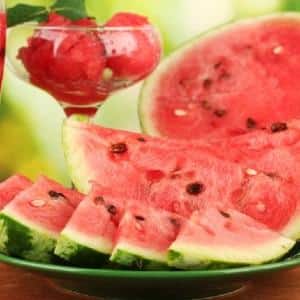 Even in a healthy person, excessive consumption of berries can have a negative impact on the functionality of the kidneys, since too much water enters the body. To maintain the therapeutic effect, on average, an adult needs to eat 1-2 kg of fruit pulp, provided there are no contraindications, but not more than 2.5 kg per day.
Even in a healthy person, excessive consumption of berries can have a negative impact on the functionality of the kidneys, since too much water enters the body. To maintain the therapeutic effect, on average, an adult needs to eat 1-2 kg of fruit pulp, provided there are no contraindications, but not more than 2.5 kg per day.
During the season, watermelon pulp is consumed fresh., as an independent dessert, added to fruit salads and processed into juice. You cannot eat the berry with dairy products, baked goods, or drink it with water, tea, or alcohol.It is not recommended to consume watermelon in the morning on an empty stomach, as it contains acids that irritate the mucous membranes and can cause nausea, stomach pain, and heartburn.
The use of watermelon rinds for hypertension
Watermelon rinds help stabilize high blood pressure. They are harvested from mid-August to the end of September and are usually consumed in winter. They contain a complex of minerals, B vitamins, amino acids, arginine and citrulline, on which blood pressure depends.
Traditional medicine recipes
Dried peels are very tasty, resemble candied fruits.
Recipe:
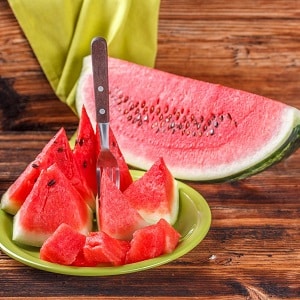 Wash the watermelon well with soapy water and pat dry with a paper towel to remove any remaining moisture.
Wash the watermelon well with soapy water and pat dry with a paper towel to remove any remaining moisture.- Cut into portions, remove the pulp. Next in the recipe, use the dense white part of the rind, peeled from the green peel.
- Cut the crusts into slices. If you are not sure about the quality of the watermelon, it is better to soak the rinds for several hours in cold water to remove toxins from the composition.
- Use a colander to remove excess liquid.
- Line a baking sheet with parchment paper and place watermelon rinds. Cook in a preheated oven at 55-60°C until light and brittle.
Cooled watermelon rinds are ready to eat. You can grind them into powder using a blender and take 1 tsp. 3 times a day. The course of treatment is 30 days. Improvements will be noticeable after the first week: weakness, dizziness and headache will disappear, endurance and performance will increase.
An infusion is prepared from the dried peels, which reduces blood pressure.. To do this, you need to pour 80 g of crusts with 500 ml of boiling water, leave under the lid for 2-3 hours.Take the cooled infusion 100 ml 5-6 times a day.
Contraindications
Watermelon is contraindicated in case of individual intolerance product. It is necessary to limit the consumption of fruit pulp for people with gastrointestinal diseases in the acute stage - with gastritis with high acidity, gastric and duodenal ulcers.
Use berries with caution and in limited quantities. in the presence of large stones in the kidneys, bladder, and other parts of the urinary system. Having a diuretic effect, watermelon can provoke the movement of stones, which is manifested by painful sensations and threatens disruption of urodynamics and changes in renal functions.
Take note:
Tips and tricks
To get the most out of watermelon It is important to choose natural fruits without harm to the body. You should not buy melons before August, since this time is considered the biological period of their ripening in nature. Early varieties contain nitrates, which speed up the ripening process.
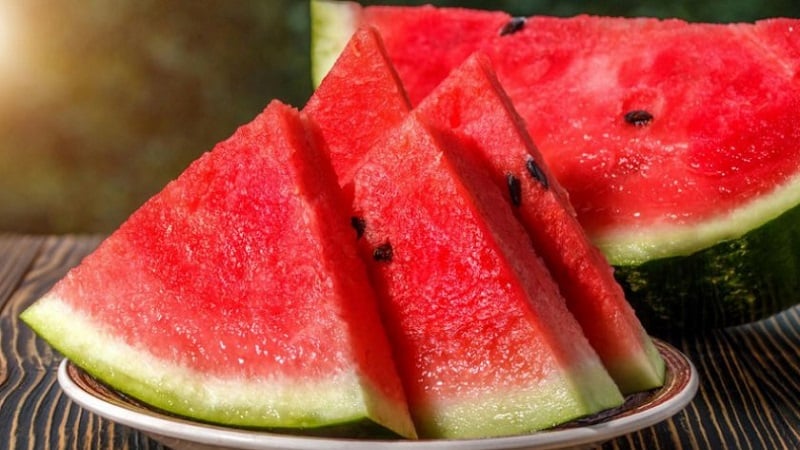
The quality of a watermelon can be determined by external signs. A high-quality watermelon weighs 5-10 kg, it is large, but not heavy, has a small yellow earthen spot on the side, a pronounced striped pattern, a matte finish without a glossy sheen, and a dry stalk. When tapped with your hand, it makes a booming sound, springs back when compressed, without signs of damage or cuts, with a dense peel.
After cutting, pay attention to the pulp. If it is deep purple in color with yellow veins, perfectly smooth and even, then it contains nitrates.A good watermelon has grains of flesh, it is red in color with white streaks.
Regarding the rules and regulations for eating watermelon for hypertension and the question of whether it is possible to consume melons and melons with high blood pressure, this should be discussed with your doctor. The specialist must exclude possible contraindications, determine methods of using fruit pulp and peels in a particular case, and prescribe adequate drug treatment.
If after eating watermelon your general health worsens, vomiting, nausea, stomach pain, spasm appear, stop eating watermelon immediately. If symptoms persist or worsen, contact a medical facility immediately for help.
Conclusion
Watermelon is a natural source of arginine and citrulline, which are necessary to normalize vascular tone and stabilize blood pressure.
The pulp and peels of melons have a diuretic effect, remove waste and toxins from the body, reduce cholesterol levels, and activate intestinal motility, which becomes the key to a successful prognosis for recovery in people with arterial hypertension.